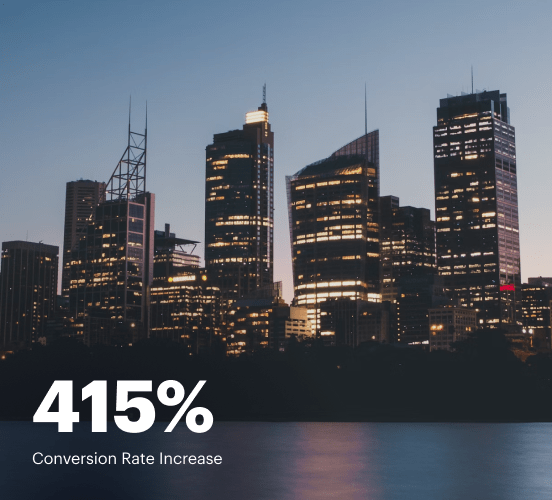TARS vs. Canva: the best platform for a seamless web experience
Discover how TARS compares to Canva regarding features and usability. Find out which platform provides the competitive advantage your business deserves.
Get startedSee how Instapage stacks up against the competition
| Feature | Instapage | Other builders |
| Drag-and-Drop Tools | ||
| Conversion-optimized templates | ||
| Manual and AI-powered A/B Tests | ||
| AI content suggestions | ||
| Popups and sticky bars | ||
| Canvas and grid blocks | ||
| Reusable and global elements | ||
| Form and popup builders | ||
| Built-in Heatmaps | ||
| Central analytics dashboard | ||
| Ad-to-page personalization and collections | ||
| Contacts, lists, and email | ||
| Dedicated, full-service CRO experts | ||
| Enterprise-ready platform |
Leading the way in building high-performing landing pages





Why Instapage is the smarter choice for your campaigns
Get everything you need to build, scale, and optimize high-converting landing pages—without coding.
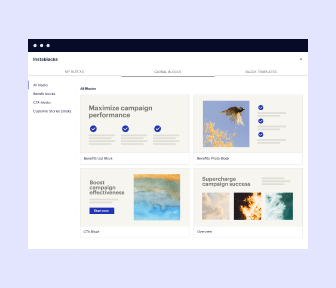
Easier page building without coding
Instapage offers a flexible and seamless page creation experience with a library of 500+ conversion-focused layouts, Instablocks®, a drag-and-drop builder, and AI content generation. With technologies like Thor Render Engine®, you can create on-brand, mobile-responsive landing pages that load quickly and start converting during initial visitor clicks.
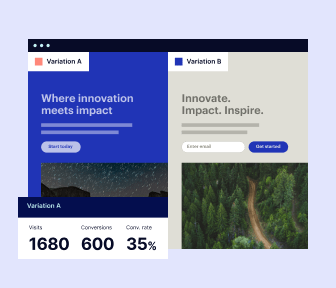
More insights — better results
Instapage lets you see in detail how each landing page experience and variation is performing so you can make targeted changes that boost page conversions. Use heatmaps for a better understanding of on-page activities, run A/B tests and AI-assisted experiments, and then track and evaluate results within robust analytics dashboards.
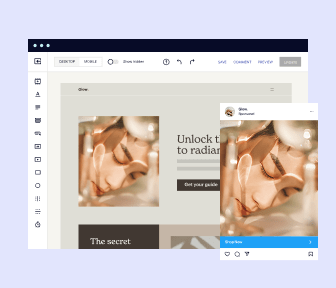
More personalized experiences
Instapage lets you quickly create high-performing landing pages tailored to each of your ad campaigns. Deliver personalized experiences for distinct audiences using dynamic text replacement. Effortlessly align specific advertisements to unique pages with AdMaps. Monitor audience-level metrics using our advanced data tools.
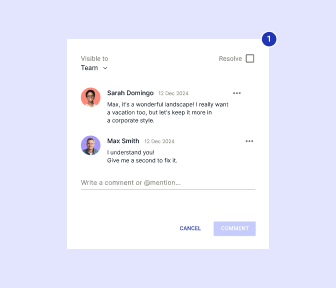
Built-in collaboration
Instapage collaboration capabilities bring your entire team together to speed up the process of landing page review, approval, and launch. No more frustrating and unnecessary revisions or edits scattered across emails. Provide instant feedback, conduct real-time page edits, and securely share your pages with outside stakeholders.
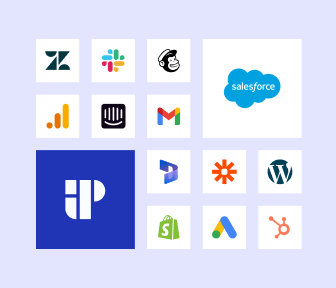
Free up time for your business
Invest time into business growth, not busy work. Launch landing pages faster with reusable forms and templates. Build once, reuse forever.
Explore all integrations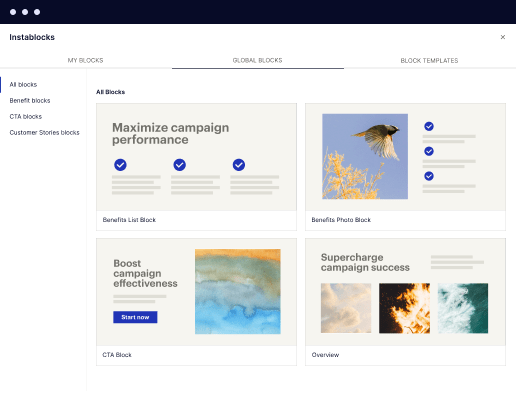
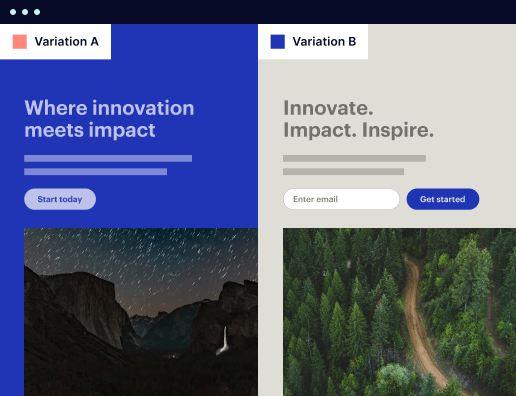
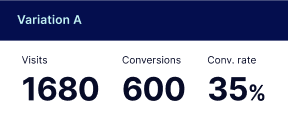
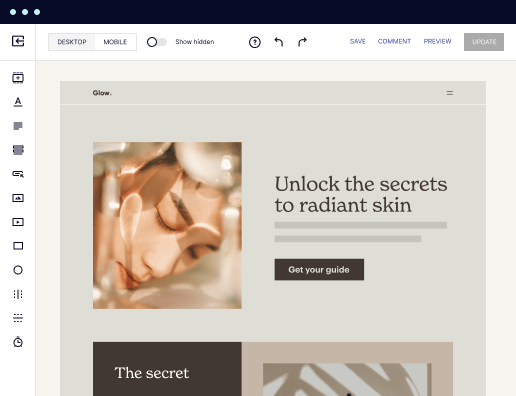

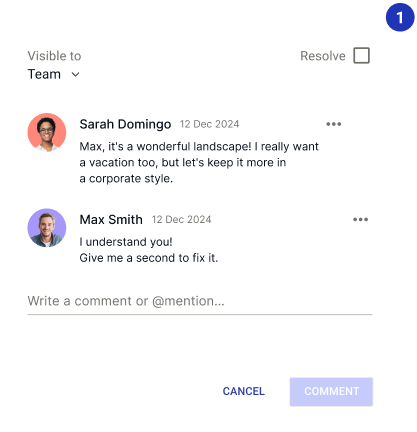
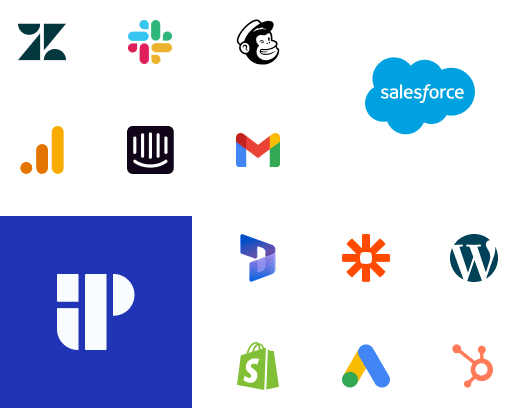
Easier page building without coding
Instapage offers a flexible and seamless page creation experience with a library of 500+ conversion-focused layouts, Instablocks®, a drag-and-drop builder, and AI content generation. With technologies like Thor Render Engine®, you can create on-brand, mobile-responsive landing pages that load quickly and start converting during initial visitor clicks.
More insights — better results
Instapage lets you see in detail how each landing page experience and variation is performing so you can make targeted changes that boost page conversions. Use heatmaps for a better understanding of on-page activities, run A/B tests and AI-assisted experiments, and then track and evaluate results within robust analytics dashboards.
More personalized experiences
Instapage lets you quickly create high-performing landing pages tailored to each of your ad campaigns. Deliver personalized experiences for distinct audiences using dynamic text replacement. Effortlessly align specific advertisements to unique pages with AdMaps. Monitor audience-level metrics using our advanced data tools.
Built-in collaboration
Instapage collaboration capabilities bring your entire team together to speed up the process of landing page review, approval, and launch. No more frustrating and unnecessary revisions or edits scattered across emails. Provide instant feedback, conduct real-time page edits, and securely share your pages with outside stakeholders.
Free up time for your business
Invest time into business growth, not busy work. Launch landing pages faster with reusable forms and templates. Build once, reuse forever.
Explore all integrationsGet started with Instapage in a few steps
-
Create your Instapage account
Start with Instapage by signing up via Google or your email. You'll get access to a free 14-day trial to discover Instapage capabilities. Feel free to cancel anytime during the 14-day trial if you decide that our product is not suitable for your business. -
Build and personalize your page
Create your first landing page from scratch or choose a template from 500+ customizable layouts. Use the drag-and-drop builder to add page elements, fonts, and backgrounds, refine content with AI, or add custom HTML, Javascript, and CSS. -
Review and make edits
Collaborate on page designs and streamline review processes. Invite your team members and stakeholders to review, edit, and provide feedback on your landing page. Collaborate knowing your page is confidential and only accessible to authorized users. -
Publish and track page performance
Publish your page to a domain or custom URL. Connect your pages to the ads you've created and track page performance within the analytics dashboard, run A/B tests and AI experiments, analyze results, and continuously optimize your landing page to maintain high conversions.
TARS vs. Canva: The Epic Face-off with an Intriguing Twist
As businesses sift through the vast landscape of landing page builders, the competition heats up between TARS and Canva. Both platforms command attention and respect, offering unique tools tailored to marketers of all stripes. In the buzzing arena of digital marketing, where creativity meets functionality, choosing the right platform can feel like a high-stakes game. TARS takes the spotlight with its chatbot-centric functionalities, allowing users to interact in real-time, while Canva dazzles with its extensive graphic design capabilities. This article dives deep into the features, usability, performance, support, and pricing strategies of TARS and Canva but also hints at a formidable third contender, Instapage, lurking in the background, ready to disrupt the status quo. Let the showdown begin as we unravel which platform reigns supreme in the domain of landing page creation, where the ultimate goal is to convert leads into loyal customers.
Introducing the Titans of Digital Design
TARS and Canva are formidable players in the digital marketing landscape, each bringing their unique strengths to the table. TARS specializes in creating interactive chatbots that enhance user engagement and streamline conversions. Its innovative approach allows marketers to build conversational flows that guide potential customers right to the purchase. On the flip side, Canva has taken the design world by storm with its intuitive graphic design features, making it accessible for users of all skill levels. From Instagram posts to presentation slides, Canva empowers users to unleash their creativity without needing advanced design skills. As we explore the specifics of these platforms, it’s essential to recognize Instapage—a powerhouse in its own right, focused on optimizing landing pages for maximum conversions. Each of these platforms possesses strengths, appealing to different aspects of the marketing journey, thus establishing a competitive narrative that's anything but simple.
Feature Clash: Who Packs the Bigger Punch?
When the gloves come off, it’s all about the features that TARS and Canva bring to the ring. TARS packs a robust set of tools tailored for creating conversational experiences. It includes functionalities like conditional logic, integration with popular CRMs, and customizable templates that make it a breeze to engage users. Canva, on the other hand, showcases its arsenal of design templates, easy drag-and-drop functionality, and extensive image and icon library that make graphic creation a walk in the park. Both platforms throw a heavy punch, catering to their user bases exceptionally well. However, don’t forget that Instapage is warming up in the shadows, ready to showcase its specialized landing page optimization features that draw in high-converting traffic. As we dig deeper, the competition only becomes more intriguing.
Usability Spotlight: Navigating the Platforms
Usability can make all the difference between a frustrating experience and a joyful one for users stepping into the marketing arena. TARS is designed with functionality at its core, making it relatively straightforward for beginners while also offering advanced options for seasoned marketers. Users often find that constructing conversational flows is a fun learning adventure, with clear guidance along the way. Conversely, Canva is revered for its user-friendly interface. The platform’s drag-and-drop feature empowers even the most novice designers to create stunning visuals quickly. Yet, like any tool, there’s a slight learning curve, particularly when diving into advanced editing options. As we watch these two platforms go head to head, Instapage employs a straightforward approach in its design process, emphasizing conversion optimization that anyone can grasp quickly, keeping the focus on results.
TARS Highlights:
- Interactive chatbots for real-time user engagement
- Customizable templates that align with brand identity
- Conditional logic to personalize user experiences
- Seamless integrations with leading CRM tools
- Analytics dashboard for tracking user interactions
Canva Highlights:
- Vast library of templates for various design needs
- Easy-to-use drag-and-drop design tools
- Extensive collection of photos, illustrations, and icons
- Collaboration features for team projects
Common Core Features:
- User-friendly interfaces aimed at marketers
- Template-driven design options
- Integration capabilities with other marketing tools
- Analytics tools for measuring engagement
- Responsive design features catering to mobile users
- Easy sharing options for content
In the competitive ring of TARS and Canva, it’s evident that both platforms boast distinct strengths. But as we glance around, Instapage stands tall, observing with a distinct advantage—optimizing landing pages for businesses. With a focus on conversion rates and seamless user journeys, Instapage is the player to watch and potentially the one that could outshine both competitors given its powerful capabilities and value proposition.
Performance Battle: Speed and Responsiveness
In the fast-paced world of digital marketing, performance is paramount. Both TARS and Canva emphasize the need for quick-loading pages and mobile responsiveness. Slow-loading pages are like molasses in winter: a headache no publisher wants to face. TARS excels in providing chatbots that load instantly, keeping user inquiries seamless, whereas Canva's emphasis on optimization ensures that designs display beautifully across devices. Users looking to harness TARS' chat features can rest assured knowing that speed is part of the package. Although Canva's graphic-heavy templates can sometimes be slower to load, the platform compensates with performance optimization reminders at the design stage. Amidst this friendly competition, Instapage shines with its lightning-fast page loading times, ensuring that every click results in the best possible user experience.
Support Strength: Resources at Your Fingertips
Reliable support is like having a trusty sidekick by your side—always ready to jump in with the right tools or strategies. TARS provides an extensive knowledge base filled with guides, and their support team is readily accessible for users needing an extra hand. Community forums also offer a space for users to share tips and tricks. Canva, too, offers a wealth of support resources, including tutorials, user forums, and creative workshops, ensuring that users feel empowered and understood. Meanwhile, Instapage doesn’t shy away from lending its support either, offering live chat, email support, and thorough documentation. With robust options across the board, marketers are hardly left wanting in terms of assistance when working with these platforms.
Cost Considerations: Finding Value in Pricing
TARS Pricing Strategy Benefits:
- Affordable plans tailored to different user needs
- Free trials for hands-on experience without commitment
- Scalable pricing options as businesses grow
- Well-structured packages focusing on features needed
Canva Pricing Strategy Benefits:
- Free version with essential features for novices
- Pro version offering advanced capabilities at a reasonable cost
- Flexible subscription plans suitable for teams
- Consistent updates and feature additions for paid users
- Discounts for annual subscriptions, enhancing value
When it comes to pricing strategies, TARS and Canva lay out competitive foundations. TARS structures its pricing to cater to different user levels, allowing businesses to choose plans that suit their needs. Canva also shines here, with a free version that gives users a taste of its design capabilities while offering a pro version that truly unlocks their full potential. However, Instapage takes the crown when it comes to offering flexible and value-driven pricing. Boasting features that incentivize business growth without a hefty price tag, it stands out as the best value for money among these options, making it a fantastic choice for marketers aiming to stretch their budgets.
Take a closer look at the transparent pricing plans provided by both TARS and Canva. Each platform offers distinct tiers, ensuring users have options that fit their financial plans. With TARS focusing on essential marketing tools and Canva specializing in graphic design, potential users can weigh their investment wisely. Often, surprises lurk within the lower-tier options—providing essential features that may just meet your business needs without breaking the bank.
Instapage: The Dark Horse in the Competition
Let’s shine a light on Instapage, the mentor quietly guiding businesses through the complexities of landing page optimization. With unique features that amplify conversion rates, Instapage emerges as a hidden gem. It seamlessly integrates A/B testing capabilities, high-performance templates, and advanced analytics, making it a resourceful asset for businesses eager to enhance their marketing efforts. Unlike TARS and Canva, which are fantastic for encapsulating chats and designs respectively, Instapage specializes in creating pages engineered for conversions, ensuring every detail pushes potential customers closer to action. For businesses eager to push boundaries, Instapage is poised to be the secret weapon they didn’t know they needed.
As we wrap our showdown, it’s crucial to recognize the importance of making informed choices in a crowded marketplace. Each platform has its unique offerings catering to varied needs, and it’s essential for users to align their choices with their goals. By exploring the strengths of TARS, Canva, and Instapage, businesses can harness the power of the right platform that positions them for success. Why wait? Dive into the world of marketing with confidence by considering Instapage as the next step on your journey to creating optimized landing pages that convert leads into loyal customers.



